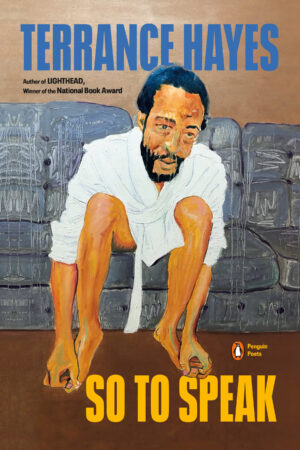So to Speak
by Terrance Hayes
reviewed by Kevin O'Connor
Following his tour de force 2018 collection, American Sonnets for my Past and Future Assassin—a jazzy sonnet cycle that addresses national and personal crises—Terrance Hayes’s latest collection, So To Speak, demonstrates his restlessly innovative talent. Beyond inventing his own structures, Hayes enriches traditional poetic forms by subverting their historic associations with exclusionary norms of race and class. Hayes’s usual themes are all here: the problems of racial and sexual self-representation, the burdens of family and political history, the quirky revelations and limits of language itself—but in So to Speak his bravura and playfulness are tempered by undercurrents of sober self-reflection.
In So to Speak, Hayes offers several more experimental American sonnets along with variations on the sestina, an even more esoteric form. His ekphrasis on African American subjects in instructional poems like “DIY Sestina: What Does This Piece Remind You Of?” reflects a racially restorative, democratic ethos. In “Illustrated Octavia Butler Do-It-Yourself Sestina,” Hayes breaks free of the tightly prescriptive end-line pattern and seven-stanza structure with his own pen-and-ink drawings. Chafing against predetermined strictures becomes a spur to invention.
Trained as a visual artist, Hayes occasionally indulges in graphic illustrations, but more often his lyrics break out into bluesy music and song. His poems work, first and foremost, because they inhabit embodied and situated speaking voices. Sounding sometimes like a huckster-impresario, other times like a pontificator, Hayes’s speakers lay out versions of a new social gospel, like this one in “An Extended Public Service Announcement”:
Mark your calendar now, Brothers & Sisters,
For end-of-the-year Watch Night services in the area.
Spend twilight to midnight in a house with a pulpit
And pews of atmospheric fellowship.
The first of the book’s three sections, entitled “Watch Your Mouth,” announces both the historic moment of Black Lives Matter and the terms of the poet’s response. In the opening of the poem “George Floyd,” hard enjambments move into violently fused locutions made up of puns and homonyms:
You can be a bother who dyes
his hair Dennis Rodman blue
in the face of the man kneeling in blue
in the face the music of his wrist-
watch your mouth …
The wordplay of the poem’s last line, “Emmet till the end of time,” turns a martyr’s name into an alliterative lament. As always, Hayes’s poems show the effects of speech under pressure.
In this collection, Hayes also wishes to connect the trauma of personal and social history to the timeless wisdom of fables. In the book’s second section, “Watch Your Step: The Kafka Virus,” Hayes pushes his metaphors and his fabulism to the limit. In “Woolworth,” set during a civil rights sit-in, a talking cat tells a “man walks into a bar”–type joke. Just like his animal characters, Hayes knows that any good joke hits on unspoken anxieties—not just about sex and death, but also about racial injustice. Though the section’s last poem, “The Kafka Verses: Thursday” does not quite reach the aching lyrical pathos of “Arbor For Butch” in Lighthead (2010), it does show Hayes’s willingness to juxtapose his own high-wire conceits with sober confessional meditation. Hayes is unafraid to show the vulnerability underlying his dazzling poetic displays:
People who have
been loved poorly may or may not be cursedto love poorly
Although Hayes’s poems often address the most pressing social issues of our time, self-exploration remains central to his lyric ambition. Hayes’s poetry thrives in the contested space between political engagement and meditative self-exploration. In “Taffeta,” he writes:
I am not trying to change the world,
I am trying to change myself
So that the world will seem changed.
It’s no surprise that So to Speak’s concluding section emphasizes the salutary effects of making and experiencing art. In his final American sonnet, Hayes reminds us of the original problem and motive:
Falling is the first & most important skill in many things.
How to fall without breaking as well as how to break.
Tell me what you pray when you are broken or break.
In its ars poetica and instructional poems, So To Speak points out possible paths of healing, if not of redemption. Whether trying to preserve “the heat and iron of love” in “How To Fold,” explaining himself to his daughter through a fable about magical goats in “Capra Aeagrus Hircus,” or discovering an Orphic legend in “The Underworld Marvin Gaye Walking Tour,” Hayes demonstrates an abiding faith in art’s power to transform our perceptions about being in a world that can sometimes break us.
Published on October 31, 2023

